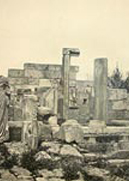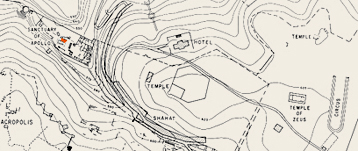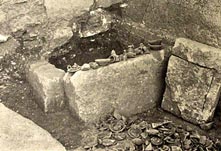
The Artemision of Cyrene
Cyrenaica
Terracottas
is an interactive web site designed for
archaeologists, art historians, historians, and classicists
who have an interest in the typological diffusion of Greek
terracottas at ancient sites in Cyrenaica, Libya, as well
as elsewhere around the Greek world.
Updated August 30, 2018 |
|
The Artemision of Cyrene Click here for the terracotta figurines
Between 1928 and 1930 Luigi Pernier and Carlo Anti conducted excavations at the temple of Artemis in the sanctuary of Apollo at Cyrene, Libya. A rich votive deposit was found in association with a primitive oikos that underlay the late classical temple. This contained fragments of late 7th and 6th century pottery, as well as objects of gold, silver, bronze, glass, amber, bone and, ivory. A handful of fragmentary terracotta figurines also was found and included part of a female head and the head of a bird.
Sometime between the end of the 5th and the beginning of the 4th century B.C. the temple of Artemis was rebuilt over the primitive oikos. A thesauros, or treasury, was constructed against the outside north wall of the second Artemision, presumably when that later building was erected (see the image at the right). An abundant accumulation of votive objects was recovered from this thesauros, including miniature vessels, fragments of a few objects in bronze, alabaster, and glass paste, a small, female head in limestone, and some nine fragments of terracotta figurines representing seated females and possibly one standing female. These female types span the 5th century proper and may have remained in production into the 4th century B.C.
- Source, L. Pernier, "L'Artemision di Cirene," in Africa Italiana 1931:4, pp. 173-228

Plan of Cyrene with the Artemision indicated in red
|

|